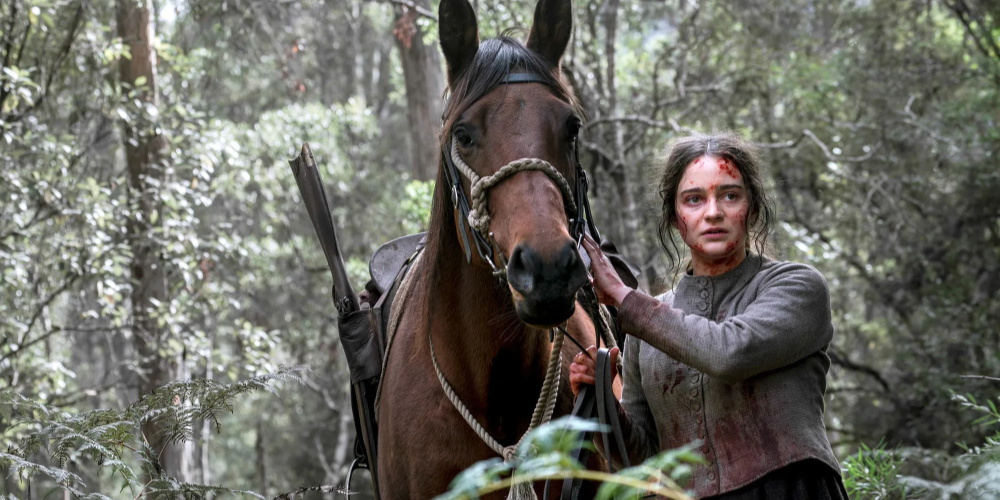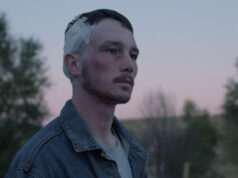As an unflinching portrayal of colonization and genocide, The Nightingale keeps its focus on the psychological trauma and is more hopeful than it seems
The Nightingale (2018)
Written and directed by Jennifer Kent. Starring Aisling Franciosi, Baykali Ganambarr, Sam Claflin, Damon Herriman, Harry Greenwood, Ewen Leslie, Charlie Shotwell, Michael Sheasby, Charlie Jampijinpa Brown, Magnolia Maymuru, Nathaniel Dean and Luke Carrol.
When The Nightingale begins, we see Irishwoman Clare Carroll (Aisling Franciosi) walking alone with her baby through the woods on her way to a military detachment where she works as a servant. At the slightest sound, she grips a knife, alert to any sign of danger around her. The year is 1825, during the British colonization of the island of Tasmania, south of the Australian mainland. It’s the outset of an extremely violent period that would later become known as the Black War, which clashed the British settlers against the Aboriginal peoples in a long massacre that would claim hundreds of lives on both sides.
As an outpost colony in the middle of nowhere, the place then known as Van Diemen’s Land was a hellhole of rapists, murderers and criminals of the worst breed, who were sent there as prisoners and endured the severest forms of punishment far from the eyes of the British Crown, mainly as a warning. It was a lawless land, where those in power could get away with murder, torture and genocide. To level the gender balance, women who had committed minor crimes were also sent there, but they would still be largely outnumbered in a place that was not safe for them by any means. When we meet Clare, she is a convict who has served her time and cannot wait to return to Ireland with her husband and child, no matter how tough her previous life used to be back home.
Nicknamed “Nightingale,” she serves drinks at the garrison and sings to officers who behave like pigs. The commander of the unit, the vicious Lieutenant Hawkins (Sam Claflin), considers Clare his property and refuses to give her a letter of recommendation that would set her free. “I decide when you leave and when you stay,” he brags, before raping her (again). The constant abuse and humiliation Clare is forced to endure — both for being a woman and an Irish — soon escalates into an ordeal and a horrid tragedy, which impels her with an Aboriginal guide named Billy (Baykali Ganambarr) on a journey up north to the city of Launceston, looking for revenge through the rugged wilderness of a dangerous land that is far from safe to travel or easy to navigate.
Written by Jennifer Kent (The Babadook), The Nightingale unfolds like a road movie through inhospitable landscapes as two groups of characters encounter mud, filth, violence, war and death along their way. It is clear that Kent has done a lot of research for the sake of authenticity, and we are never spared the horrors, like when an Aboriginal woman is gang-raped by soldiers or a dead man’s head is cut off and taken as a trophy by the worst type of people one could ever meet. It’s hell on Earth, but Kent is more interested in the psychological, much like what she did with The Babadook. If anything, this is a perceptive examination of trauma in a place where life is cheap and means very little, something made clear when a character is shot dead just for yelling.
It’s a hard-hitting subject, and Kent approaches it with the rawness it deserves, opting for a grayish palette, half-lights and rooms dimly lit by candles. Likewise, the sparse use of music adds to the naturalism of what we see, making Clare and Billy’s songs stand out even more from the world’s ugliness whenever they sing. The bleakness becomes almost a character, and Kent simply refuses to look away from the horror or dilute its importance, even elongating the brutal scenes to examine their impact but without ever romanticizing the violence. And while it’s rare to see any moments of humor here to soften the blow, they also happen to be surprisingly organic — like when a shocked Billy says after seeing Clare attack a man, “If that one’s your husband, you need another husband.”
But more interesting is the poetic way the film compares its characters to encaged birds who yearn to be free, especially when Clare tells us the story of a frightened little bird calling for her mom to protect her and take her home back to safety — and later on, when she commits a brutal act in the woods, the silence that follows is only broken by a faint birdcall and the fluttering wings of a bird flying up in the sky, as though Clare’s soul has taken the first step towards freedom and now cannot turn back. Franciosi does a great job conveying so many emotions at once, such as fear, grief and anger, while letting us see the character’s growth from initial distrust and prejudice against Billy to an inevitable understanding of what unites them despite their cultural differences.
Those differences are at the center of The Nightingale, and they are brought home by an intense performance by Yolngu actor Baykali Ganambarr, who plays a lost man carrying in his heart the misery of someone who has seen everything taken away from him (even his dignity as a human being) by marauders who dare to use a term like “civilizing the land” as a euphemism for genocide and ethnic cleansing. In fact, my favorite moment in the entire film is Billy’s perplexed reaction after being allowed to eat at the table with a couple of white benefactors who feel quite generous about themselves and yet can’t seem to realize they shouldn’t even be living there in the first place.
And that’s what makes The Nightingale not just a story of revenge, but also of resistance. When Clare says, “They stole something from me, and I want to get it back,” she means a lot more than she even realizes. It’s about her womanhood, her dignity and self-respect as someone who can’t take it anymore after being crushed down by such a harsh place. For two souls from completely different cultures who come to recognize how similar they are in their oppressed state, it could only seem crazy for them to accept all those absurdities we have today, such as transphobic feminists, misogynist blacks, Islamophobic jews or racist gays. In the film’s last scene, a bittersweet but hopeful moment spells our need for a lot more empathy and union in brighter times to come.





